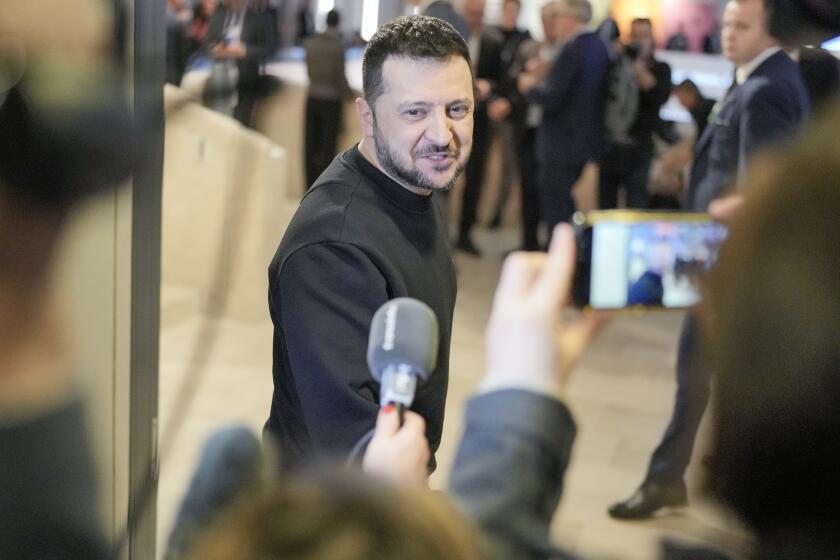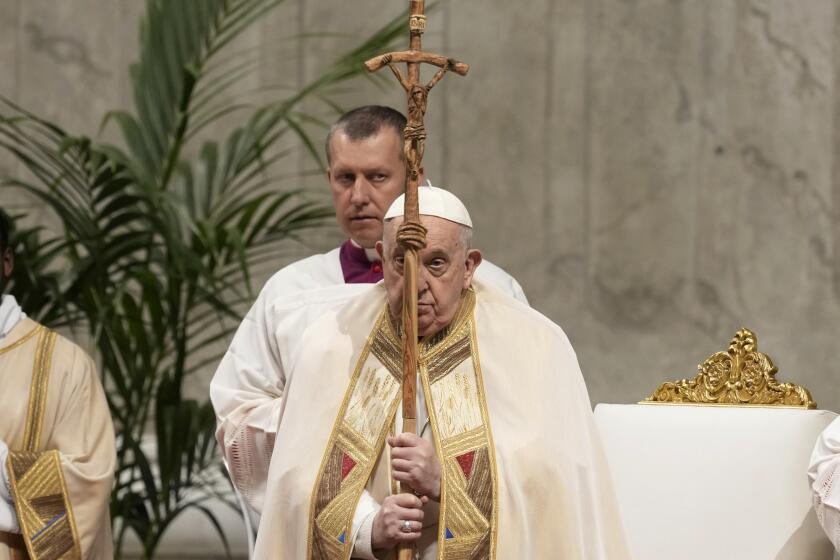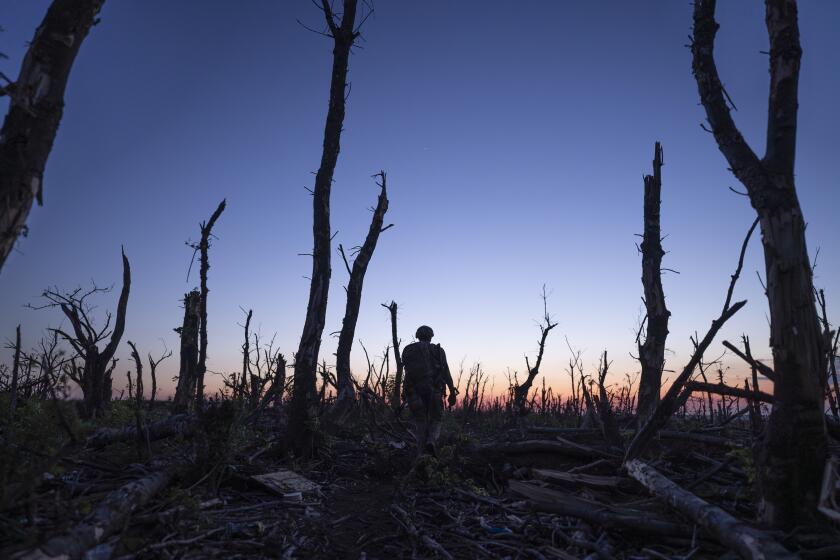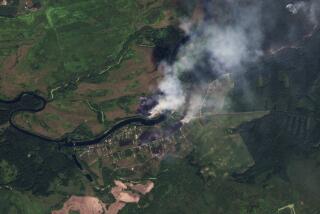Pope Francis’ ‘white flag’ comment is met by criticism from Ukraine and its allies
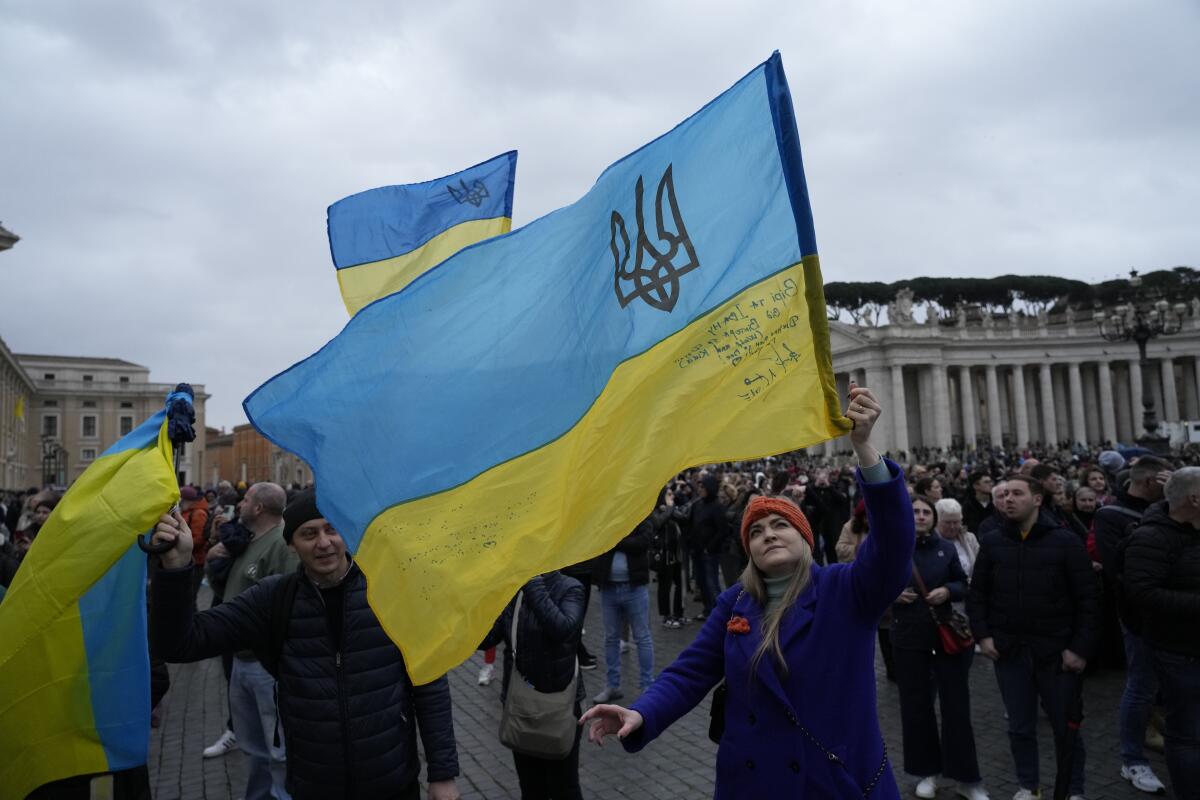
- Share via
KYIV, Ukraine — Ukrainian and allied officials criticized Pope Francis for saying that Kyiv should have the “courage” to negotiate an end to the war with Russia, a statement many interpreted as a call for Ukraine to surrender.
The foreign minister of Poland, a vocal ally of Kyiv, and Ukraine’s ambassador to the Vatican, both used World War II analogies to condemn the pope’s remarks. And a leader of one of Ukraine’s Christian churches on Sunday said that only the country’s determined resistance to Moscow’s full-scale invasion, launched by Russian President Vladimir Putin on Feb. 24, 2022, had prevented a mass slaughter of civilians.
In an interview recorded last month with Swiss broadcaster RSI and partially released Saturday, Francis used the phrase “the courage of the white flag” as he argued that Ukraine, facing a possible defeat, should be open to peace talks brokered by international powers.
“How about, for balance, encouraging Putin to have the courage to withdraw his army from Ukraine? Peace would immediately ensue without the need for negotiations,” Polish Foreign Minister Radek Sikorski responded with a post on X, formerly Twitter.
In a Ukrainian village, a woman wants only one thing: to find her husband, who disappeared shortly after Russia’s war on Ukraine started two years ago.
In a separate post, Sikorski drew parallels between those calling for negotiations while “denying [Ukraine] the means to defend itself” and European leaders’ “appeasement” of Adolf Hitler just before World War II.
Andrii Yurash, Ukraine’s ambassador to the Holy See, said that it was “necessary to learn lessons” from that conflict. His tweet appeared to compare the pope’s comments to calls for “talking with Hitler” while raising “a white flag to satisfy him.”
Vatican spokesman Matteo Bruni later clarified that the pope supported “a stop to hostilities [and] a truce achieved with the courage of negotiations,” rather than an outright Ukrainian surrender. Bruni said that the journalist interviewing Francis used the term “white flag” in the question that prompted the controversial remarks.
“I think that the strongest one is the one who looks at the situation, thinks about the people and has the courage of the white flag, and negotiates,” Francis said, when asked to weigh in on the debate between those who say that Ukraine should agree to peace talks and those who argue that any negotiations would legitimize Moscow’s aggression.
French President Emmanuel Macron appears isolated on the European stage after saying he could not rule out the possibility of Western troops being sent to Ukraine.
Kyiv remains firm on not engaging directly with Russia on peace talks, and Ukrainian President Volodymyr Zelensky has said multiple times that the initiative in peace negotiations must come from the country that has been invaded.
Throughout the war, Francis has tried to maintain the Vatican’s traditional diplomatic neutrality, but that has often been accompanied by apparent sympathy with the Russian rationale for invading Ukraine, such as when he noted that NATO was “barking at Russia’s door” with its eastward expansion.
Although the pope has spoken in the past about the need for talks between Kyiv and Moscow, the RSI interview appears to mark the first time when he publicly used terms such as “white flag” or “defeated” while discussing the war.
In the RSI interview, Francis insisted that “negotiations are never a surrender.”
Ukrainian President Volodymyr Zelensky says he’s worried at the prospect of Donald Trump returning to the White House.
“When you see that you are defeated, that things are not going well, you have to have the courage to negotiate,” he said.
Archbishop Sviatoslav Shevchuk, the head of the Ukrainian Greek Catholic Church, said Sunday that surrender isn’t on the minds of Ukrainians.
“Ukraine is wounded, but unconquered! Ukraine is exhausted, but it stands and will endure. Believe me, it never crosses anyone’s mind to surrender. Even where there is fighting today: listen to our people in Kherson, Zaporizhzhia, Odesa, Kharkiv, Sumy,” Shevchuk said while meeting with Ukrainians in New York City. He mentioned the regions that have been under heavy Russian artillery and drone attacks.
Shevchuk also spoke of the brutality of Moscow’s invasion, referencing the town near Kyiv where Russian occupation left hundreds of civilians dead in the streets and in mass graves. He argued that, if not for Ukrainians’ fierce resistance as Russian forces marched on the capital in February 2022, the gruesome scenes seen in Bucha would have been “just an introduction.”
During the Angelus prayer on Sunday from the window overlooking St. Peter’s Square, Francis said that he was praying “for peace in the tormented Ukraine and in the Holy Land.”
Pope Francis has reaffirmed Christians’ special relationship with Jews amid rising antisemitism since the outbreak of the Gaza war in a letter to the Jews of Israel.
“Let the hostilities which cause immense suffering among the civilian population cease as soon as possible,” he said.
Elsewhere, Ukraine and Russia reported civilian deaths Sunday after overnight trading drone, missile and shelling attacks that also caused a fire at a Russian oil depot and targeted Ukrainian power stations, according to officials.
Ukrainian air defenses overnight shot down 35 out of 39 drones launched by Russia, air force commander Mykola Oleshchuk reported, following a 4½-hour barrage that officials said damaged unspecified industrial sites in southern Ukraine and also targeted power stations.
Two people died under rubble after Iranian-made Shahed drones around midnight struck private homes and state offices in Dobropillya, a large Ukrainian-held town in the east, authorities said.
The year started with high hopes for Ukrainian troops planning a counteroffensive against Russia but ends with anxiety over aid from allies.
In Myrnohrad, another eastern Ukrainian town, 11 civilians were wounded after Russian missiles overnight struck residential buildings, the local prosecutor’s office reported. It also posted photos of rubble lining the courtyard outside a high-rise apartment building, its windows blown out, and of cars parked outside that appeared reduced to piles of twisted metal.
A woman also died in Russia’s Kursk region, which borders Ukraine, after shells fired from Ukraine set her house on fire, according to local Gov. Roman Starovoit, who also said that the woman’s husband suffered severe burns.
Starovoit also said that debris from a downed Ukrainian drone sparked a fire at an oil depot in the Kursk region.
Nine Ukrainian drones targeted the Belgorod region, another southern Russian province that borders Ukraine, overnight and Sunday, according to local Gov. Vyacheslav Gladkov. Later Sunday, Russia’s Defense Ministry said that two drones were shot down over the Novgorod region in northern Russia, more than 620 miles from the Ukrainian border. There were no immediate reports of casualties.
Susie Blann writes for the Associated Press. AP reporters Nicole Winfield and Giada Zampano in Rome, and Vanessa Gera in Warsaw contributed to this report.
More to Read
Sign up for Essential California
The most important California stories and recommendations in your inbox every morning.
You may occasionally receive promotional content from the Los Angeles Times.


